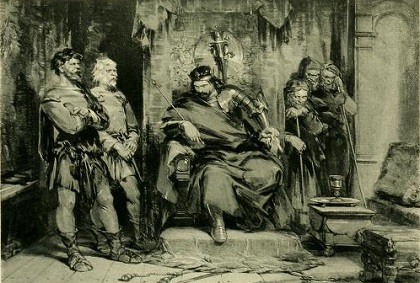| directory |
| home | contact |
|
|||||||||||||||
| search | |||||||||||||||
Enter Three Murderers: Was Macbeth the third murderer?From The tragedy of Macbeth according to the first folio. Ed. Allan Park Paton.The question here starts up: Was Macbeth himself the third murderer at Banquo's death? We do not remember having seen this suggested by any Shakesperean commentator. Yet we think there are grounds for believing that it was part of Shakespeare's design -- that he purposely left it untold in words, and, as it were, a secret to be found out; and, to any one accepting such a view, the tragedy will be found, we believe, deepened in effect. The following are the circumstances on which we rest the opinion: 1. Although the banquet was to commence at seven, Macbeth (as he had foretold his queen and courtiers) did not go there till near midnight. 2. He had no more than entered the room of state when the first murderer came to tell him of the deed, apparently freshly committed. 3. Absent and alone four or five hours, how had Macbeth been employed? With such a dreadful matter at issue, he could not have been resting or engaged in any other business. He must have been taken up with the intended murder some way or other; and, for ourselves, we cannot conceive of his going to the banquet with the barest chance of his plot miscarrying, and of Banquo's arriving in the midst of the gaiety, with the narrative of the inexplicable and alarming attempt. But if he waited away till his mind would be relieved by a knowledge of the assassination, this could not have been, unless he was personally engaged in it, because it was after he went that he was told. He had indeed actually commenced, in a hearty and confident manner, his duties as host when the stained messenger entered. 4. The two murderers employed (opposite types of evil instruments -- the one world-sick, and the other world-hating) Macbeth had been, as we know, at great pains to influence for his purpose; and if there had been a third man in whose hands he could have put himself, and to whom he could have committed the superintendence of the others, we certainly should have heard of that man. He would have been Macbeth's chief confidant, and as such would in all probability have been first to reach the banquet room, carrying the longed-for tidings. 5. The first murderer told Macbeth that he "cut Banquo's throat," that was his work; but there were twenty wounds in the victim's head -- "twenty mortal murthers." A needless and devilish kind of mutilation, not like the work of hirelings. 6. When the third murderer unexpectedly joined the others (be it observed, just before the attack, as if he separately had been listening for the returning travellers), he repeated the orders they had got, so precisely as at once to remove their doubt. He was the first to hear the sound of horse. He showed unusual intimacy with the locality, and the habits of the visitors, &c. It was he who identified Banquo. Probably to do away with the chance of his being recognised, he seems to have struck down the light (although he asked about it); and it was he who, searching the ground, found Fleance escaped. 7. Just as Banquo was struck down, the First Murderer, in his excitement, says: "Well, let's away, and say how much is done."But we know that he did not go at once, for at the feast he tells Macbeth, that "safe in a ditch he bides." Some one must have reminded him that the body must be disposed of: it was not to lie about proclaiming murder; it was to be engulphed in a moorland rut. Macbeth's words, after the appearance of Banquo's ghost, are: "If Charnel houses, and our Graves must sendThis "burying" allowed Macbeth to be back at the Castle, to get cleaned and robed, and be present at the feast. ("There's blood upon thy face," would apply to dried blood.) 8. There was a levity in Macbeth's manner in his interview with the first murderer at the banquet, which has been frequently remarked on by editors, &c., and which well might be if he personally knew that Banquo was dead. (The passages, "Then comes my fit again," &c., and "There the grown Serpent lies," &c., should, doubtless, be spoken to himself). 9. When the Spirit appears, Macbeth asks those about him "which of them had done it," evidently to take their suspicion off himself (for he knew); and his words -- "Thou canst not say I did it: never shakesound very like "In yon black struggle you could never know me." We said that, accepting such a view, we thought the tragedy deepened in effect. For instance, it shows Macbeth's terrible degradation in that he could personally, and along with hired murderers, assassinate his friend and fellow-soldier. The "twenty mortal murthers" exhibit the fear of criminal ambition in its utmost activity. In the king disguised, being but a little ago a murderer in the gloom, and now in his regal robes presiding over a banquet, we have a striking contrast. And the shock he sustains on beholding Banquo's phantom is surely intensified through his certainty of his having himself destroyed him, and left him dead beyond all question. How to cite this article: ______________ Even More |

More to Explore |
©1999-2021 Shakespeare Online. All Rights Reserved.